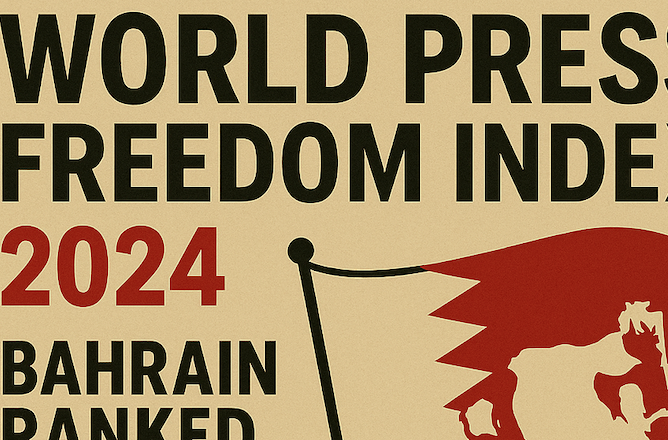The Bahrain Center for Human Rights (BCHR) expresses its deepest concern over the systematic repression of press freedom in Bahrain. Over the past decade, the Kingdom has witnessed the complete dismantling of independent journalism, the arrest and persecution of journalists, and the criminalization of speech in all its forms. Bahrain’s media environment today is one of state control, surveillance, and fear, where truth is treated as a threat and journalism is punished as a crime.
The End of Independent Journalism: The Closure of Al-Wasat
In June 2017, Bahrain witnessed the closure of its last independent newspaper, Al-Wasat—a landmark institution that for years offered nuanced reporting, critical commentary, and a space for public debate in an otherwise shrinking civic environment. The Ministry of Information suspended the newspaper without due process, accusing it of “spreading division and undermining Bahrain’s interests.” In reality, Al-Wasat was the final remaining platform for diverse opinions, moderate critiques, and independent journalism.
With its closure, Bahrain officially became a country without independent press. All newspapers and licensed media today are either state-owned, state-aligned, or operating under strict government censorship. No space remains for dissent, and all editorial lines are expected to serve the interests of the ruling authorities.
BCHR affirms:
“The closure of Al-Wasat was not an administrative act—it was a political message. It signaled that dissent, even in its mildest journalistic form, will not be tolerated.”
Arrests and Prosecution of Journalists: Silencing the Witnesses
Since 2011, numerous journalists in Bahrain have faced arbitrary arrest, torture, enforced disappearance, defamation campaigns, travel bans, and prison sentences simply for performing their journalistic duties. Charges often include:
“Spreading false news”
“Inciting hatred against the regime”
“Misusing electronic networks”
Supporting terrorism”
In many cases, journalists are detained without access to legal counsel, subjected to interrogation without due process, and tried before courts that lack independence.
Among the documented cases:
- Photojournalists have been arrested for covering protests.
- Social media activists have been detained for tweeting critically.
- Bloggers and writers face surveillance, exile, or online harassment.
- In some cases, journalists were physically assaulted or tortured in custody to extract confessions.
This pattern of abuse is not incidental—it is part of a state-led strategy to prevent documentation and public awareness of the widespread human rights violations occurring in Bahrain.
A Controlled Narrative: Censorship and Media Blackout
Bahraini authorities strictly control the media narrative through:
- State regulation and licensing of all media outlets
- Pre-publication review and the banning of politically sensitive topics
- Blocking of independent websites and news platforms
- Denial of access to foreign journalists and international media
Since the 2011 uprising, access to Bahrain for international media has been heavily restricted, especially for those covering protests, political repression, or sectarian discrimination. Journalists from The New York Times, Al Jazeera, BBC, Human Rights Watch, and others have been denied entry or deported.
This intentional blackout ensures that the government’s violations go unreported, both inside and outside Bahrain.
International Obligations and Legal Violations
Bahrain is a State Party to the International Covenant on Civil and Political Rights (ICCPR), which guarantees freedom of expression and access to information. Yet, its actions violate:
- Article 19 of the ICCPR: The right to hold opinions without interference and to seek, receive, and impart information.
- UNESCO and UN General Assembly resolutions that call for the protection of journalists and press freedom.
In addition, Bahrain’s continued misuse of cybercrime and anti-terrorism laws to prosecute journalists contradicts international standards on proportionality and necessity in restricting speech.
The Human Cost of Silence
The silencing of journalists is not only an attack on individual freedoms—it is a collective punishment against a society’s right to know, to question, and to participate. Without journalists:
- Victims of torture remain invisible.
- Political prisoners lose their voice.
- Discrimination, corruption, and abuse go unchecked.
- The public is denied the tools to hold power accountable.
In the absence of press freedom, truth becomes a prisoner—and with it, democracy and justice.
BCHR Director Nedal Al-Salman states:
“When journalism becomes a crime, repression becomes policy. Bahrain’s journalists are not enemies—they are witnesses. Silencing them is an assault on memory, truth, and the people’s right to know.”
BCHR Calls for the Following Immediate Actions:
- Release all journalists, bloggers, and media professionals currently detained for their work.
- Reinstate Al-Wasat or allow for the establishment of independent media outlets free from state control.
- End the misuse of laws to prosecute peaceful expression, including online speech.
- Grant access to international media and allow coverage of trials, protests, and civil society developments.
- Collaborate with international human rights mechanisms to reform media laws in line with Bahrain’s legal obligations.
- Cease all forms of intimidation and harassment targeting journalists and their families.
There is no accountability without journalism. No reform without transparency. And no justice without a free press.
Bahrain must end its war on journalism and recognize that press freedom is not a threat—it is the cornerstone of any society that aspires to dignity, equality, and truth.

